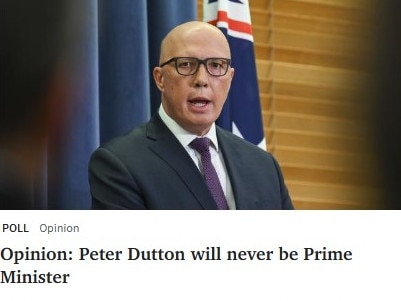Opinion: Why Peter Dutton ultimately proved unelectable
In November 2023 I wrote that Peter Dutton would never become prime minister. Here’s why I was right, says Paul Williams. VOTE IN OUR POLL
Opinion
Don't miss out on the headlines from Opinion. Followed categories will be added to My News.
In November 2023 I wrote in this column that Liberal leader Peter Dutton would never become prime minister.
I copped enormous flak for calling an election result 18 months out, and for pillorying an opposition leader I said was doing His Majesty’s opposition a grave disservice.
My reasons for forecasting a Coalition defeat were then based largely on Dutton’s “Dr No” mantle. In short, Dutton chose to play the easy role of carping opposition leader – lazily exploiting inflation angst and blindly criticising every Labor policy to ease the cost of living – while eschewing the opportunity to become a credible alternative prime minister.
We all hoped Dutton would evolve, that he would grow into the job, and that the Coalition would eventually deliver timely, sensible and costed policies to address inflation and heal our ideological divisions.
But Dutton did not change. He did not evolve. Instead, he allowed himself and his Coalition to snipe from the sidelines in the hope of slipping under the media radar and into government with neither scrutiny nor the hard policy work required of alternative governments.
Between Dutton’s cynical sinking of the 2023 referendum and the official commencement of the campaign last month, the Opposition’s policy folder – the slimmest I’ve seen in 40 years – was comprised largely of building unpopular nuclear reactors and ending “wokeism” (whatever that means).
By the time Dutton released real policy detail – his work-from-home policy, and the subsequent backflip, looked like they were written on the back of an envelope on the way to a media conference – it was too late for an increasingly savvy electorate.
As former Liberal prime minister John Howard always warned, you can’t fatten the calf on market day.
While no one saw the Labor landslide coming – Labor’s own internal polling indicating a small parliamentary majority suggests a very late swing by undecided voters – with the benefit of 20/20 hindsight, no one should be that surprised, either.
With the Liberals attracting their lowest primary vote since the party’s formation in 1944, and Labor winning its largest after-preference support (higher than Whitlam’s, Hawke’s or Rudd’s) since 1943, the Liberals, hitherto Australia’s most successful federal party (holding national office 75 per cent of the time), it’s clear Dutton and the Liberals appealed to very few urban Australians.
Note I cite the Liberals’ performance, and not that of the Nationals, whose primary vote increased slightly, and who appear to have lost just one seat, Calare in NSW, to the Independent Andrew Gee. Gee, of course, defected from the Nationals over the Coalition’s opposition to the Voice to Parliament, and his easy re-election confirms the silly culture wars Dutton and others waged since 2022 meant nothing to voters when the economy was at stake.
That’s why Nationals leader David Littleproud should be shielded from blame for Dutton’s debacle. He has proven an articulate advocate for regional Australia, and calls for his scalp are ill-advised. But if there is a criticism of Littleproud, it’s that he didn’t stand up to Dutton, or attempt to modify the opposition’s more extreme moves.
The mere fact Liberal deputy Sussan Ley and not Littleproud was deputy opposition leader was always bizarre – an oversight the Nationals are now bound to correct given they now comprise 40 per cent of the Coalition.

In sum, the Liberals’ problem is that Albanese’s Labor – like Hawke’s – now owns the middle ideological ground the Coalition so happily vacated after Tony Abbott’s victory in 2013. Labor not only enjoys the support of almost all the middle class but now much of the “Howard battler” working class, too.
Labor’s mission will be to build on the popular and successful social democratic experiment that now resembles a new welfare state. But as inflation calms and unemployment potentially rises, three challenges emerge: how to keep the budget goodies flowing, how to raise industrial productivity, and how to rein in debt and deficit.
For an ageing Australia supporting a growing retiree class, this presents a fourth challenge: sourcing new streams of revenue to pay for Labor’s largesse. In response, Albanese is likely to target a corporate sector many insist does not pay its fair share. Indeed, according to the Australian Taxation Office, more than 1200 large companies paid no tax at all in 2022-23.
The final challenge is how Albanese will engage a corporate Australia likely to become (on the heels of a decimated Liberal Party) the de facto opposition in Australia. Will Albo’s populism quash an agitated business class, or will Big Capital wear down Albanese as it did Kevin Rudd?
Watch this space.
Paul Williams is an associate professor at Griffith University
Originally published as Opinion: Why Peter Dutton ultimately proved unelectable




